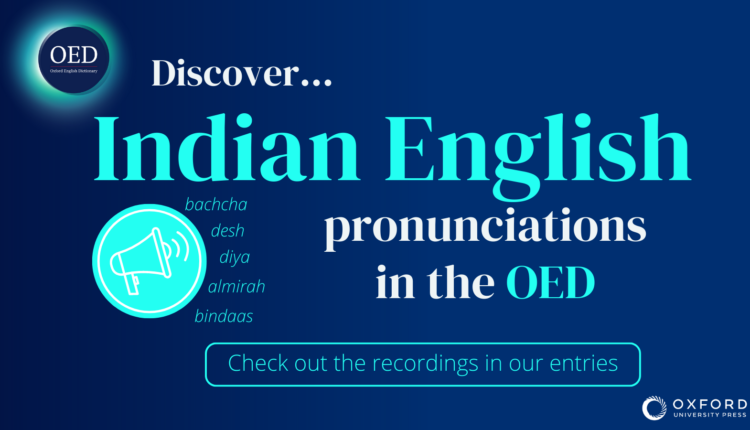Indian English pronunciation added to the Oxford English Dictionary
New Delhi – Announcement of the addition of Indian English pronunciations to the Oxford English Dictionary.
Pronunciation transcriptions and audio for over 800 entries particularly associated with Indian English, including desh (a person’s or a people’s native country or place of origin), diya (a small cup-shaped oil lamp, typically made of baked clay, often used on religious occasions such as the Diwali festival), bachcha (a child; also a young animal), almirah (a free-standing cupboard, wardrobe, or other storage unit), and bindaas (bold; independent; admired; fashionable), are now available in the Oxford English Dictionary (OED).
Since 2016, the OED has been expanding its pronunciation coverage for numerous global varieties of English. For those words which show region-specific usage or meanings (New Zealand, Scottish, or Caribbean English, for example) the dictionary has added a region-specific pronunciation, alongside the British and American pronunciations given as standard across the entire dictionary. Indian English brings the total number of global varieties covered in the OED’s pronunciations to sixteen. Offering audio alongside pronunciation transcriptions allows OED users to hear the pronunciations as well as read them. This most recent addition to the World English pronunciation audio archive fills a large gap for the 130 million Indian English speakers in India.
The audio for each region-specific word has been recorded by a speaker from the relevant region, following a pronunciation model based on recent phonetic research, pronunciation models, and the expertise of native speakers.
Dr Catherine Sangster, Pronunciations Editor for the OED, says: “Ever since we started work to expand and include audio in our coverage of pronunciations for varieties of English besides British and U.S. English, Indian English has been one of our biggest priorities and also one of our biggest challenges. I am delighted that we have developed a transcription model to capture its complexity and can now offer pronunciations for this extremely important variety of English in the OED.”
Dr Matthew Moreland, Senior Consultant Phonetics Editor at Oxford Languages, and Lecturer in Phonetics at the University of East Anglia, says “The journey to this point has involved reflection on exactly what it means to present pronunciations in an English dictionary, delving into questions of naturalization and the ways in which speakers of different languages and cultures interact. The resulting transcription model is a celebration of the glorious sounds and combinations of sounds fused together in such a rich and fascinating manner, and which together make Indian English unique.”
Danica Salazar, World English Editor for the Oxford English Dictionary says “The addition of Indian English pronunciations to the OED is an important step forward in documenting the lexicon of a variety spoken by such a large section of the world’s English-speaking population. It makes the OED an even more useful tool for those wishing to do research on world varieties of English.”
For more information visit the Indian English section of the World Englishes Hub, where you can watch this video on Indian English pronunciations in the OED, and read this blog post on naturalization and Indian English.
MORE ABOUT OXFORD UNIVERSITY PRESS IN INDIA
Oxford University Press has had a presence in India for the last 110 years. The first OUP India branch was opened at Mumbai (formerly Bombay) in 1912 and publishes a wide range of learning and knowledge resources, including Dictionaries in 13 Indian languages.
WHAT IS THE OXFORD ENGLISH DICTIONARY (OED)?
The OED is an unsurpassed guide to the meaning, history, and pronunciation of over 855,000 words, senses, and compounds – past and present – from across the English-speaking world. As a historical dictionary, the OED is very different from those of current English, in which the focus is on present-day meanings. You’ll still find these in the OED, but you’ll also find the history of individual words, and of the language – traced through over 3.7 million quotations, from classic literature and specialist periodicals to film scripts and cookery books.
HOW DOES A WORD QUALIFY FOR INCLUSION IN THE OED?
A word will be considered for inclusion in the OED when we have gathered independent examples from a good variety of sources, and evidence that the word has been in use for a reasonable amount of time.
ABOUT OXFORD LANGUAGES
Oxford Languages, part of Oxford University Press, is committed to unlocking the power of language for learning and for life. Our world-class language research programme builds on over 150 years of experience and technological innovation to deliver authoritative, evidence-based content in more than 50 languages.
From bespoke language datasets to self-service APIs to our flagship Oxford English Dictionary, all Oxford Languages content is uniquely curated and delivered by our expert team of lexicographers, linguists, and language technologists to the highest of standards. We bring this unparalleled expertise to partnerships across the globe as we work with like-minded innovators to advance learning and communication for future generations. Trusted by big tech, academic institutions, and local community initiatives alike, our language data is at the forefront of global communication, powering the products, research, and projects that are making language knowledge available to all.

